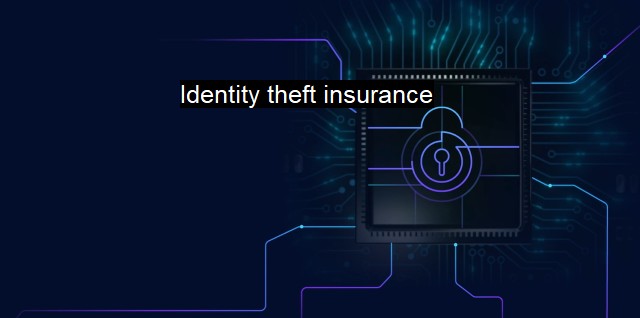What is Identity theft insurance?
Protecting Digital Identity: Exploring the Benefits of Identity Theft Insurance in Today's Tech-Driven World
Identity theft insurance is a kind of insurance coverage that is intended to protect individuals from the possible consequences linked with identity theft. It is a cybersecurity measure that has gained relevance due to the vast proliferation of digital technology which has resulted in escalating instances of identity theft.The focus of identity theft insurance is often on mitigating the fallout. It provides coverage for the cost of reclaiming your financial identity, which means the cost you might incur to salvage the compromised parts or your identity as a whole. These costs may include phone bills, lost wages because of time taken off work to resolve the issues, notary and mailing costs, or even legal fees if required.
Identity theft is a crime in which an imposter obtains key pieces of personally identifiable information (PII), such as Social Security or driver's license numbers, to impersonate someone else. With this data, thieves can potentially upend a person's life by hijacking their financial accounts, damaging their reputation, or even altering their medical records. Thus, the insurance coverage present provides a financial cushion to deal with such problems.
In the current excellent environment of cyber threats posed by phishing scams, ransomware attacks, database hacking incidents, insecure online transactions, and various forms of online fraud, identity theft insurance becomes indispensable. Unprotected Wi-Fi networks, traffic interceptions, and insecure websites offer ample opportunities for perpetrating scams and thefts. Modern identity thieves are experts at gleaning valuable private data and exploiting it for their benefit.
This is where the relevance of antivirus software steps in. Antivirus software is a computer program used to prevent, detect, and remove malware. It keeps your computer and other devices safe from many forms of malware, including viruses, trojans, and ransomware. It is essential in safeguarding personal and financial information.
Antivirus software is capable of scanning files and directories and defending your computer from malicious attacks. It also provides real-time protection, ensuring that your device is continuously protected. With an active antivirus, you are less likely to be vulnerable to data theft, keeping you one step ahead of the identity thieves. Good antivirus software also spot phishing attempts, strengthening your defense against cyber-attacks.
An antivirus's role is integral to cybersecurity, and when combined with identity theft insurance, they deliver comprehensive protection against digital threats. The antivirus will ward off attacks that could compromise your personally identifiable information, while the insurance offers remedial measures on the financial plate if your identity is stolen despite all precautions.
While conventional homeowner's or renter's insurance may provide some coverage for losses due to identity theft, they don't typically cover all the costs. Identity theft insurance's main role is not to reimburse you for money that has been stolen but to support you in the process of recovering your identity. Given an increase in identity theft incidents in recent times, insurance providers have started offering identity theft insurance as either standalone policies or as an endorsement to an existing policy.
The world is becoming increasingly digitized, and our personal information is getting more vulnerable to theft. It is important to view identity theft insurance and antivirus software as integral parts of our cybersecurity strategy. Even though insurance can't prevent identity theft, it provides a safety net of financial and emotional support when dealing with the aftermath of an identity theft incident. Similarly, while an antivirus program can't make you invincible to cyber threats, it keeps most malware at bay, ensuring your digital safety to the best extent possible. Together, identity theft insurance and robust antivirus protection form a strong, intertwined defense strategy against the dual threats of data and financial loss.

Identity theft insurance FAQs
What is identity theft insurance?
Identity theft insurance is a type of insurance policy that covers the costs of restoring your identity after experiencing identity theft or fraud. It typically provides coverage for expenses such as legal fees, lost wages, and sometimes credit monitoring services.Do I need identity theft insurance if I have antivirus software and use cybersecurity measures?
While antivirus software and other cybersecurity measures can help protect your personal information online, they don't guarantee total protection against identity theft. Identity theft insurance can provide an additional layer of protection and financial assistance in case you experience an identity theft incident.What does identity theft insurance not cover?
Identity theft insurance typically doesn't cover direct monetary losses resulting from identity theft, such as stolen money from your bank account. It also may not cover fraudulent charges made on your credit cards if you didn't report the loss or theft in a timely manner.How can I purchase identity theft insurance?
You can purchase identity theft insurance as a standalone policy, but it may also be included as an add-on to your existing homeowners or renters insurance policy. You can contact your insurance provider to inquire about their options and pricing for identity theft insurance.| | A | | | B | | | C | | | D | | | E | | | F | | | G | | | H | | | I | | | J | | | K | | | L | | | M | |
| | N | | | O | | | P | | | Q | | | R | | | S | | | T | | | U | | | V | | | W | | | X | | | Y | | | Z | |
| | 1 | | | 2 | | | 3 | | | 4 | | | 7 | | | 8 | | |||||||